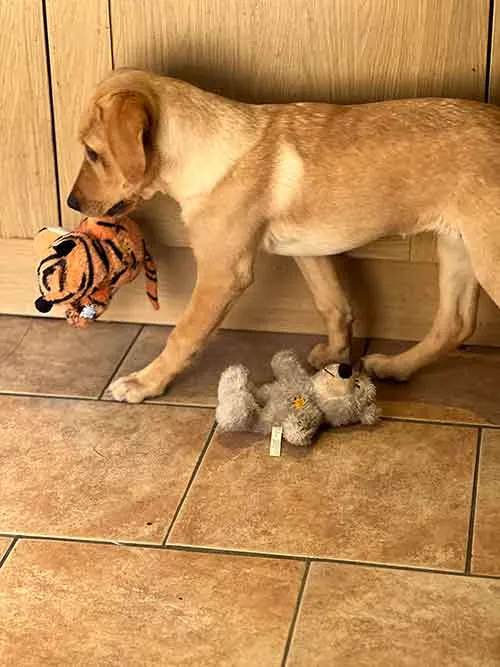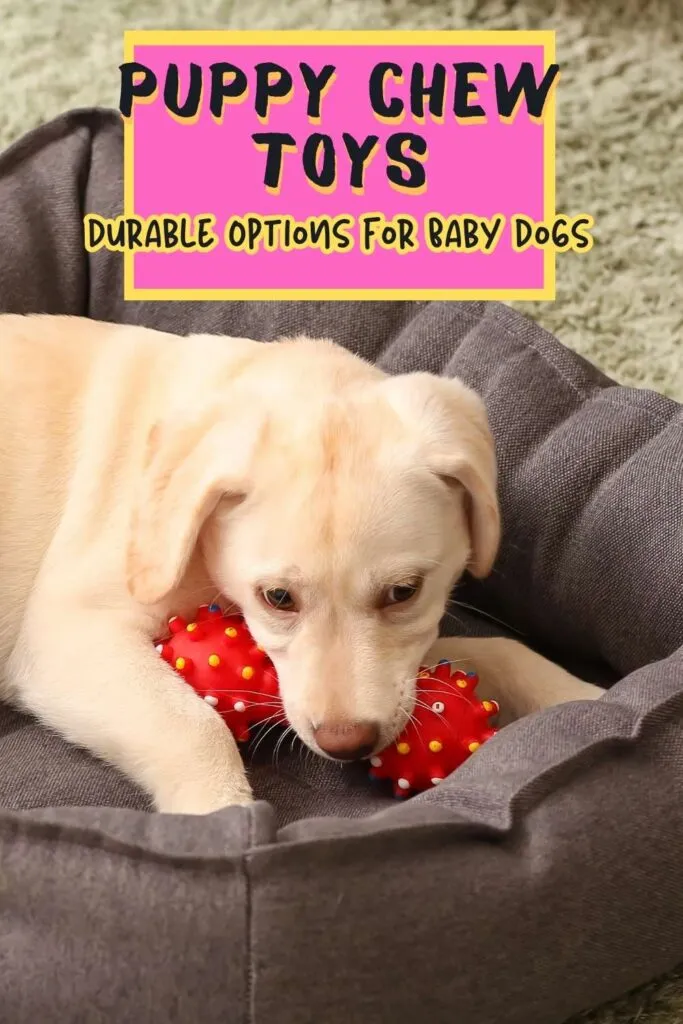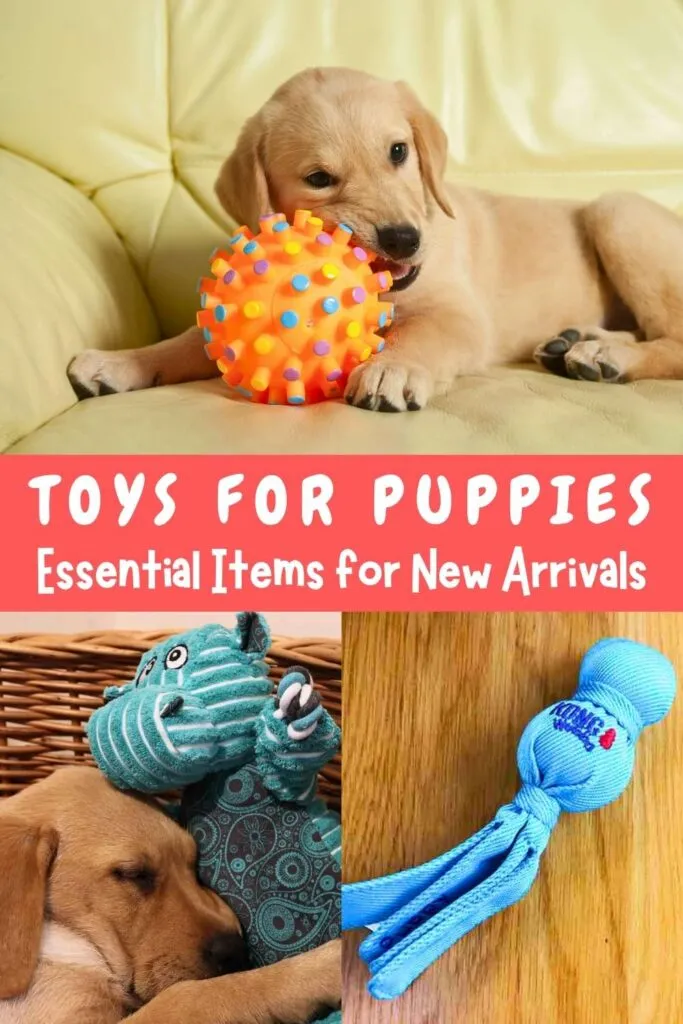Bringing home a Labrador puppy is an exciting time, filled with boundless energy, playful antics, and, inevitably, a lot of chewing. Lab puppies, known for their strong jaws and natural inclination to explore the world with their mouths, require incredibly durable and appropriate chew toys to keep them stimulated and prevent them from turning household items into their personal playthings. Finding the Best Chew Toys For A Lab Puppy means looking for items that can withstand rigorous chewing, offer varied textures, and promote healthy development without posing a risk.
As an editor for “Dog Care Story” and a long-time dog owner, I’ve seen countless toys come and go. My own Lab puppies have put many through the ultimate test. While the market is flooded with options, my experience has shown that certain toys consistently stand up to the challenge, providing both entertainment and essential chewing outlets for these enthusiastic pups. This guide shares my top recommendations, focusing on durability, safety, and the diverse chewing needs of a growing Labrador.
The Chewing Needs of a Lab Puppy
Chewing is a natural and vital behavior for puppies, especially Labs. It helps relieve discomfort during teething, strengthens their jaws, and provides mental stimulation, which is crucial for their overall well-being. A lack of appropriate chewing outlets can lead to destructive behaviors, frustration, and even anxiety in puppies. Lab puppies, in particular, need toys that can satisfy their powerful chewing instincts, which often exceed those of smaller breeds. Offering a variety of textures is key, as puppies enjoy exploring different sensations with their mouths, much like they would interact with various parts of a natural food source.
Soft Toys for Comfort and Gentle Play
While Labs are known for their strong chew, soft toys still play a crucial role in a puppy’s development. There’s nothing quite as heartwarming as seeing a puppy snuggled up with their favorite plush toy. Soft toys often serve as a comfort object, helping new puppies feel secure in their new homes. However, it’s essential to choose soft toys that offer some degree of durability, as many standard plushies won’t last long against a determined Lab puppy.
From my experience, the Kong range of soft toys stands out for its superior toughness compared to other brands. While no soft toy is truly indestructible, Kong’s offerings tend to last considerably longer. It’s realistic to expect that soft toys will eventually succumb to a puppy’s chewing, so don’t plan on them becoming heirlooms. If a soft toy lasts until your Lab puppy is six months old, that’s a commendable achievement.
The Kong Wild Knots Range
The Kong Wild Knots range is a fantastic option for puppies that enjoy softer textures but also need durability. These toys feature minimal stuffing, with a robust, pliable knotted rope skeleton inside. This design provides an engaging chewing experience that helps satisfy a puppy’s urge to chew, redirecting their attention from inappropriate items like furniture or fingers. My Labrador puppy, Bonnie, particularly enjoys the Wild Knots toys with a ribbed exterior, such as the hippo and elephant, or even the rabbit in the same style.
 Labrador puppy chewing on a Kong Wild Knots Tiger toy
Labrador puppy chewing on a Kong Wild Knots Tiger toy
The Kong Cross Knots toys, like the lion or the cute blue monkey, are also excellent. They offer a bit more cuddliness, making them perfect companions for nap time while still being robust enough to handle some chewing.
Kong Wubbas
Kong Wubbas offer a similar function to other durable soft toys. These toys resemble an octopus, with a fabric-covered head containing a squeaky rubber ball and trailing legs made from tough canvas-type material. They come in both large and puppy sizes. Bonnie still has her puppy Wubba, and it’s one of the few soft toys she’s allowed to take into the garden for rougher play. However, the head of the Wubba is often the most vulnerable part; once a puppy breaches it, the toy should be removed to prevent them from ingesting the inner plastic ball, which isn’t chew-proof.
Prolonging the Life of Soft Toys
You can’t entirely stop a determined Lab puppy from eventually destroying soft toys, but you can significantly reduce the risk of damage.
- Choose Quality: Investing in toys from reputable manufacturers like Kong, known for their durability, can make a big difference. They might be more expensive upfront, but they often outlast cheaper alternatives.
- Introduce Early: An eight-week-old puppy is less likely to aggressively dissect a new teddy than a twelve-week-old puppy, who is a more determined chewer. Introducing soft toys early can establish them as comfort objects rather than items to be “explored” for their contents.
- Mend Promptly: If you notice a small tear or hole, mend it immediately. Once a puppy discovers the joy of pulling out stuffing, the battle is often lost.
- Minimal Stuffing: Toys in the Kong Knots range have minimal stuffing, and some toys are completely stuffing-free. This reduces the temptation for puppies to pull out and potentially swallow the contents, which can lead to digestive issues. If mending isn’t an option, discard stuffed toys as soon as the stuffing begins to emerge.
- Offer Multiple Toys: A variety of toys can help prolong the life of individual soft toys. If a puppy has only one soft toy, they might become overly focused on it, leading to more aggressive chewing. A selection keeps them engaged with different items.
Ultimately, while soft toys may not last forever, they fulfill an important need for puppies by offering a variety of surfaces to chew on. Chewing on softer, pliable items can be relaxing for puppies and can help redirect their chewing instincts away from your furniture or bedding. When soft toys start to fall apart, they become unsafe and should be mended or discarded.
Tough Rubber Toys for Serious Chewers
For the more intense chewing sessions, tough rubber toys are indispensable for a Lab puppy. These toys are designed to be highly durable and can withstand significant wear and tear. Many of my older dogs have enjoyed these types of toys for years. While puppies sometimes need a little encouragement to engage with hard rubber toys, they are essential for satisfying their need to chew on something more substantial.
My top picks include the Kong red bone, the Kong ring, and the classic Kong puppy toy that can be filled with treats. To get the most out of these, especially with a young Lab puppy, active engagement is often required. You might need to play fetch, tug-of-war, or, in the case of the original Kong, fill it with a delicious, mushy treat and freeze it. This turns it into a long-lasting puzzle that can keep a puppy happily occupied, particularly when they are crated. The original Kong is so effective that even the full-size adult version can be used from the start for Lab puppies, though a dedicated puppy version is also available. For exceptionally powerful chewers, the black Kong offers an even stronger option.
 Labrador puppy with a durable chew toy
Labrador puppy with a durable chew toy
Addressing Destructive Wood Chewing with Tree Root Toys
Some Lab puppies develop a strong preference for chewing on hard, wooden objects, often to the dismay of their owners’ furniture. If your puppy consistently makes a beeline for your baseboards or table legs, it indicates a need that rubber toys might not fully satisfy. In such cases, providing a safe, hard, wooden alternative can be a game-changer. Tree root chews are an excellent solution.
These chews are made from specific types of tree roots that are extremely tough and, crucially, do not splinter dangerously like ordinary wood. While not inexpensive, their durability and ability to provide hours of satisfying chewing make them a worthwhile investment. They can significantly reduce a puppy’s desire to chew on inappropriate wooden items around the house. Be aware, however, that these root chews can be quite heavy, so take care not to drop them on your toes!
The Debate Around Hard Chews: Risks and Benefits
When discussing hard chew toys for Lab puppies, it’s important to acknowledge both the benefits and potential risks. Just like humans, dogs can fracture their teeth, which is a painful condition requiring veterinary intervention, often involving costly dental surgery under general anesthesia. Chewing on excessively hard objects can increase this risk. A 1999 study revealed that over a quarter of five thousand dogs treated for dental problems had fractured a tooth, with causes including playing and catching hard objects. While puppies are not the peak age for tooth fractures, the risk associated with very hard chews, such as antlers and weight-bearing bones from large animals, is a valid concern.
Many veterinarians advocate for eliminating all hard chew toys and replacing them with items that have some “give” or flexibility. A simple “thumbnail test”—can you make a dent in the toy with your thumbnail?—is often used to differentiate safe, pliable toys from potentially risky hard ones.
For a long time, I personally adhered to this protocol. However, I’ve recently returned to providing my dogs with antlers to chew on, and I want to explain my reasoning for this decision, without necessarily recommending it for everyone. The primary reason is the lack of truly effective alternatives that offer the same level of chewing satisfaction. Many rubber toys, while durable, don’t hold a dog’s long-term interest for recreational chewing. Dogs might play with them, especially interactively, but they often don’t lie down and chew on them for extended periods in the same way they would a bone or antler. Natural rawhide chews and items like pig’s ears can be appealing, but they break down quickly and can lead to vomiting if swallowed in large pieces.
The Inherent Need to Chew
Through years of raising dogs, I’ve observed that chewing is a significant source of pleasure and a fundamental physical need for many of them. It provides deep relaxation. While my dogs receive bones as part of their raw diet, they still derive immense satisfaction from relaxing with an antler afterward. I believe it’s important for them to experience this natural pleasure.
Less Destructive Behavior
Lab puppies, like all puppies, can be destructive, chewing on items you don’t want them to. Many will chew on baseboards, walls, and furniture to satisfy their need to bite down on something hard. While frozen, treat-filled Kongs can help, I’ve found that providing opportunities for recreational chewing on highly valued items like bones or antlers significantly reduces inappropriate chewing and helps puppies relax. This is a major factor in my decision to reintroduce these items.
Whether or not you choose to take on the perceived risks associated with harder chews depends on your specific situation, your puppy’s chewing habits, and your comfort level. It is always wise to try alternatives first and to consult with your veterinarian as new products and research emerge.
Clean Teeth
For dogs fed on kibble, chewing bones and antlers can contribute to dental hygiene. A study showed that chewing on bones effectively reduced dental calculus in a group of beagles by 88% after twenty days. This aligns with what I’ve observed in my own dogs since switching to a raw diet. While tooth brushing is often recommended by the veterinary profession, its adoption rate among dog owners remains low.
My Pick of the Best Puppy Toys
Based on extensive personal experience with Lab puppies, here are my top recommendations for essential chew toys:
- Kong Wild Knots Teddy (Large Size): This is Bonnie’s dark brown teddy in many of the photos. The small size is tiny, so for a Lab puppy, the large one is ideal. It’s incredibly light, making it easy for even an eight-week-old puppy to carry around. It provides comfort and a satisfying chewing texture. For puppies that are aggressive chewers, the knotted rope interior makes it more durable than standard plush toys.
- Kong Wild Knots Elephant or Hippo: Similar to the teddy, these offer a durable, soft-but-tough chewing experience. If your budget allows, puppies also enjoy the smaller versions of these types of toys for throwing around. They are designed to be durable dog toys for heavy chewers, offering a safe puppy chew for aggressive chewers in a softer format.
- The Original Kong: This iconic rubber toy is a must-have. It can be filled with mushy food (like wet dog food, peanut butter, or yogurt) and then frozen, providing a long-lasting and engaging challenge. This is particularly useful for crate training or when you need your puppy to be independently occupied. While a puppy version exists, the full-size adult Kong is often suitable from the start for Lab puppies. For power chewers, the black Kong is an even stronger option.
- Kong Red Bone and Kong Ring: These are tough rubber chew toys that can withstand heavy chewing. While puppies might need some encouragement to engage with them initially, they are excellent for fulfilling the need to chew on hard, yet flexible, surfaces. These are fantastic durable dog toys for heavy chewers.
- Tree Root Chews: For Lab puppies that show a strong inclination to chew on wood, a high-quality tree root chew is invaluable. It provides a safe, non-splintering outlet for their natural instincts and can save your furniture.
 Yellow Lab puppy with various toys
Yellow Lab puppy with various toys
Multiple Dogs and Puppy Toy Jealousy
A quick note for households with older dogs alongside a new Lab puppy: be mindful of toy jealousy. Dogs do not have a concept of “sharing”; toys are either “mine” or “not mine,” based on possession. An older dog wanting the puppy’s toy isn’t being selfish; they simply perceive it as a desirable object. Attempting to teach an older dog not to touch the puppy’s toys can be an uphill battle. Instead, I recommend keeping the puppy’s prized toys out of the older dog’s reach, such as in a puppy playpen or crate. This ensures the puppy can enjoy their toys undisturbed during rest or independent play.
Conclusion
Choosing the best chew toys for a Lab puppy is crucial for their physical and mental health. A thoughtful selection of durable, varied, and appropriate toys can satisfy their strong chewing instincts, alleviate teething discomfort, and prevent destructive behaviors. From the comforting resilience of Kong Wild Knots and Wubbas to the serious chewing power of rubber Kong toys and tree roots, providing a diverse “toy chest” is key. While the debate around harder chews like antlers and bones continues, understanding the risks and benefits, and consulting with your veterinarian, will help you make the best decision for your unique Lab puppy. By investing in quality chew toys and managing their use, you can ensure your Lab puppy grows into a happy, well-adjusted companion with appropriate outlets for their natural behaviors.
